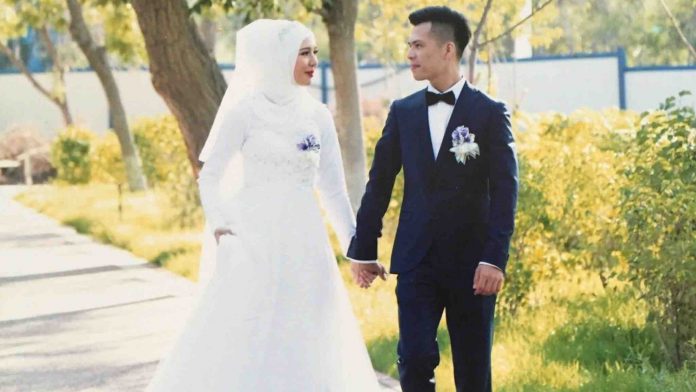Australian-born Mehray Mezensof has been married to her husband, Mirzat Taher, 30, for almost five years.
But he has been absent for most of this period.
The 27-year-old told Sky News the young couple have only spent 14 months of their marriage together, as Mr Taher was in and out of China’s so-called “vocational education and training” schools and detention centres – which some US officials have referred to as “concentration camps”.
On 1 April this year, he was sentenced to 25 years in jail, for involvement in alleged “separatist” political activities in Turkey.
She says the claims are “ridiculous” – and based on suspicion, rather than factual evidence.
Sir Iain Duncan Smith, co-founder of the Inter-Parliamentary Alliance on China, is calling on the G7 to act – and soon.
He told Sky News that the UK, as a host of the summit, has a duty to speak out against the “genocide” happening “right under our noses”.
Sir Ian said Britain can “no longer turn a blind eye” to China’s abuse towards its Uighur and minority populations and must “reconsider how we trade” as the UK and other Western countries are too dependent on China.
The former Conservative party leader says the Western world “allowed” China to join the free market without adhering to principles of democracy, the rule of law and human rights – what Francis Fukuyama termed “the end of history” – and the G7 now has the opportunity to fix this.
“In the chase for cheaper production… the ‘greedy route’ as I call it… we relied on an anti-democratic and brutal government… but we cannot separate business and trade from human rights.”
Ms Mezensof has kept quiet up until now to protect their family, and with the hope that the Chinese Communist Party would release her husband sooner, if they were seen to be “co-operating”.
She said: “My husband is a good person. He isn’t a criminal. He isn’t political. He hasn’t done anything wrong, he’s innocent.”
His only crime, she told Sky News, is being ethnically Uighur.
According to Amnesty International, an estimated one million people, most of them Uighurs – a Muslim ethnic group living largely in the northwest Chinese province of Xinjiang – are believed to have been detained inside “re-education camps” by the Chinese authorities since 2017.
Although the UK government has declined to get involved, MPs in April passed a motion declaring Uighurs are being subjected to “genocide” and “crimes against humanity” in China.
The first steps of an independent “people’s tribunal” in the UK was under way last week, to decide if this is true.
It heard that Uighurs are treated “worse than dogs” and “tortured day and night” in Chinese camps in Xinjiang.
Ms Mezensof was born and raised in Melbourne, Australia. Her parents emigrated from the Xinjiang region in northwestern China more than 35 years ago.
When she was 22, she travelled for the first time to the region’s main city, Urumqi, and met Mr Taher – a moment she describes as “love at first sight”.
After an Islamic ceremony, the couple were married on 3 August 2016 with plans to settle in Melbourne.
Ms Mezensof extended her stay in Xinjiang while they waited for Mr Taher’s Australian visa to come through.
At this time – things started to change.
“There were a lot of whispers going around,” she said.
“People were disappearing in the middle of the night, police were coming and taking them away. No one knew where they were going, how long for.
“There was constant monitoring, surveillance. Heavy police presence – you’d get stopped on the street a lot to get your phone checked.
“We needed permission from the police to leave the city – you’d have to tell them where you were going, how long for…
“Everyone was on edge.”
China’s crackdown on Uighurs and other minorities was beginning to ramp up in 2017, and Ms Mezensof’s family in Melbourne became increasingly concerned for her safety.
Shortly after Mr Taher was granted a visa on 1 April 2017, the couple immediately booked plane tickets for Australia, due to fly out 11 days later.
However, one day before their flight was due to leave, police turned up at Mr Taher’s house and took him away for questioning.
But he did not come home.
Mr Taher was held in a detainment centre for 10 months, and consequently transferred to two different “schools” for “re-education” – where Uighurs who are thought to be “extreme” or “terrorist-like” are sent by state officials.
The Chinese authorities deemed him “dangerous” because he had travelled to Turkey in 2014 and 2015.
It’s thought he and other Uighurs in Turkey – who, like him, are ethnically Turkish and not Han Chinese – rallied against the Chinese state with the supposed aim of establishing independence from mainland China, Ms Mezensof understands.
Human Rights Watch report that, during this time, the Xinjiang authorities made foreign ties a punishable offence.
State officials targeted those with connections or travel history to “26 sensitive countries” – including Turkey – and subsequently interrogated, detained, and in some instances imprisoned those people.
However, despite claiming – and demonstrating – his visits consisted of a holiday and opportunity to study Turkish on a student visa, Mr Taher was held by the state for two years, until his unexpected release on 22 May 2019.
He had “graduated” from his “re-education” school and was deemed safe enough to re-integrate back into society.
Several weeks later, the couple reunited at the Urumqi airport.







